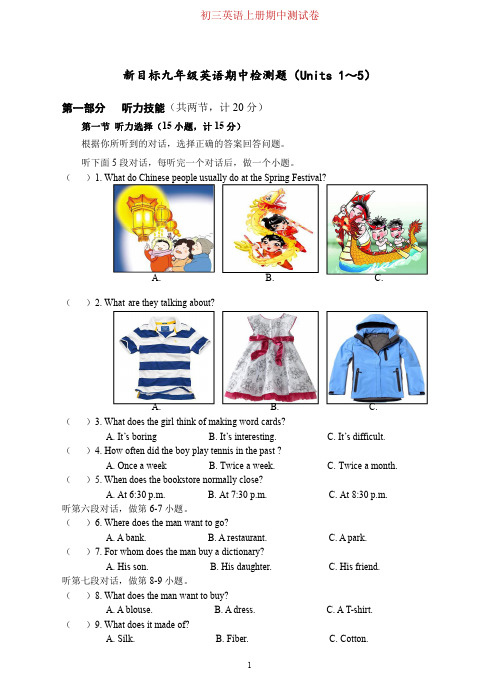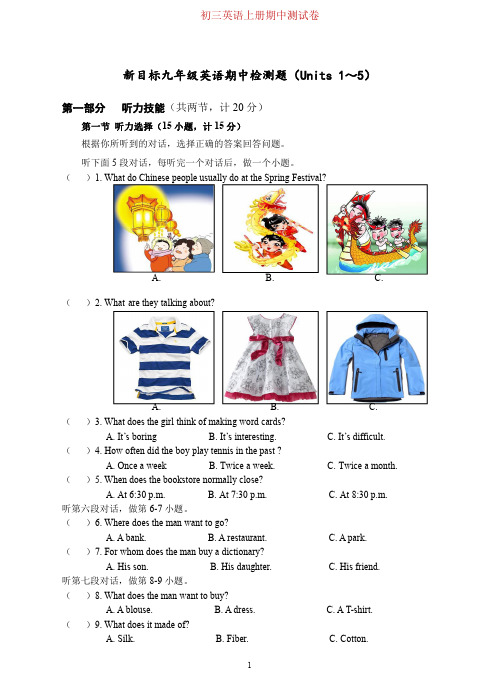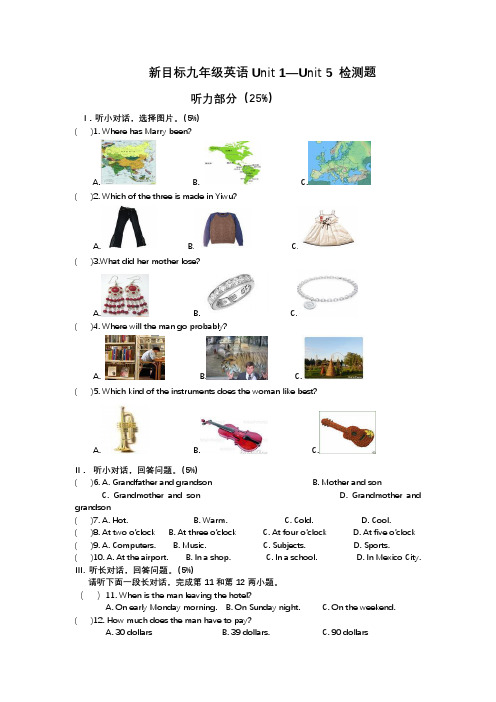新目标九年级英语Units 1 - 5
初三上学期英语期中试题,人教版九年级上册英语期中考试试卷及答案(Units1~5)

新目标九年级英语期中检测题(Units1~5)第一部分听力技能(共两节,计20分)第一节听力选择(15小题,计15分)根据你所听到的对话,选择正确的答案回答问题。
听下面5段对话,每听完一个对话后,做一个小题。
()1.What do Chinese peopleusually do at the Spring Festival?A. B. C.()2.What are they talking about?A. B. C.()3.What does the girl think of making word cards?A.It’s boringB.It’s interesting.C.It’s difficult.()4.How often did the boy play tennis in the past?A.Once a weekB.Twice a week.C.Twice a month.()5.When does the bookstore normally close?A.At6:30p.m.B.At7:30p.m.C.At8:30p.m.听第六段对话,做第6-7小题。
()6.Where does the man want to go?A.A bank.B.A restaurant.C.A park.()7.For whom does the man buy a dictionary?A.His son.B.His daughter.C.His friend.听第七段对话,做第8-9小题。
()8.What does the man want to buy?A.A blouse.B.A dress.C.A T-shirt.()9.What does it made of?A.Silk.B.Fiber.C.Cotton.听第八段对话,做第10-12小题。
()10.What’s the relationship between the two speakers?A.Cousins.B.Classmates.C.Sister and brother.()11.What did Ann use to be like?A.Short and outgoing.B.Short and quiet.C.Tall and quiet.()12.Where will Jack go?A.Paris.B.London.C.Ottawa.听第九段对话,做第13-15小题。
新目标英语九年级Units 1—5重点短语回顾

重点短语回顾
湖 北省 武汉 市 李 兆
1. end up 结 束; 告终 (Unit 1) If you drive your car like that, you will end up in hospital. 如果 你那 样 开车 最后 总 要 弄到进 医 院才 完事。 2. not a t all 根本 不; 全然 不 (Unit 1) He doesn’t seem at all interested in my plan. 我好 象对 我的 计划 毫不 感兴 趣。 3. ma ke mista ke s 犯 错; 出 错 (Unit 1) He made a terrible mistake but refused to admit it. 他 犯了 严重 错误 , 可是 拒不 承认 。 4. be a fra id to 害怕 去做… … (Unit 1) Don’t be afraid to ask questions. 提 问 题 不要 有顾 虑。 5. la ugh at 笑话; 取笑( 某人) (Unit 1) It ’s unkind to laugh at a person who is in trouble. 嘲笑 一 个 处在 困 境 中的 人 是 不 厚道 的。 6. take notes 做笔 记; 做 记录 (Unit 1) Did you take notes of the lectures? 你 听 课记了 笔 记吗? 7. look up ( 在 词典 或 参 考 书 中) 查阅 ( 词或 资料) (Unit 1) If there are words you do not understand, look them up in the dictionary. 如 果有 你 不 认 识 的词 , 可 以查 词典 。 8. ma ke up 组成 ; 构成 (Unit 1) A car is made up of many different parts. 汽车由 许多 不同 的零 件 组成。 9. de a l with 处理 ; 料理 (Unit 1) I’m used to dealing with matters of this kind. 我 习惯 处理 这类 问题 。 Inflation is one of the most difficult issues for any government to deal with. 通 货 膨 胀 是 任何 一个政 府 最难 处理 的问 题之 一。 10. be a ngry with 对 … …感 到 生气 ; 愤
人教版九年级上册英语期中试题(附答案)

新目标九年级英语期中检测题(Units1~5)第一部分听力技能(共两节,计20分)第一节听力选择(15小题,计15分)根据你所听到的对话,选择正确的答案回答问题。
听下面5段对话,每听完一个对话后,做一个小题。
()1.What do Chinese peopleusually do at the Spring Festival?A. B. C.()2.What are they talking about?A. B. C.()3.What does the girl think of making word cards?A.It’s boringB.It’s interesting.C.It’s difficult.()4.How often did the boy play tennis in the past?A.Once a weekB.Twice a week.C.Twice a month.()5.When does the bookstore normally close?A.At6:30p.m.B.At7:30p.m.C.At8:30p.m.听第六段对话,做第6-7小题。
()6.Where does the man want to go?A.A bank.B.A restaurant.C.A park.()7.For whom does the man buy a dictionary?A.His son.B.His daughter.C.His friend.听第七段对话,做第8-9小题。
()8.What does the man want to buy?A.A blouse.B.A dress.C.A T-shirt.()9.What does it made of?A.Silk.B.Fiber.C.Cotton.听第八段对话,做第10-12小题。
()10.What’s the relationship between the two speakers?A.Cousins.B.Classmates.C.Sister and brother.()11.What did Ann use to be like?A.Short and outgoing.B.Short and quiet.C.Tall and quiet.()12.Where will Jack go?A.Paris.B.London.C.Ottawa.听第九段对话,做第13-15小题。
新目标英语九年级Units 1-5复习过关测试题

.
一
He
is
’
w
il l
.
c o m e
a n
d pla y
B
w
it h
’
m e
if h e
—
—
。
bu s y
A
.
.
W On w
t
be
he
笔试 部分
C is
.
n
t
0 u
D
、
i ll b e
w
(
Ⅱ 选择填 空
.
)3 5
—
.
C
ld y o u lo k
u
is it is it
v
v
—
ll
.
B
y
.
he
he
ill y o
A
.
i ge tt
n
g
a w a
B
.
i g e tt
n
g g
—
u
a
p
C D he
r s e
.
w o u
(
)3 2
C g e t tin g o f My d a u g ht e
.
一
D ge
.
ttin to
lo n g
—
.
he
n
yo u
w
A
.
I ha
v e
n o
t im
e
B D
.
I d
’
’
r a
t he
v e
r
新目标九年级英语Unit 1-5

新目标九年级英语Unit 1—Unit 5 检测题听力部分(25%)I.听小对话,选择图片。
(5%)( )1. Where has Marry been?A. B. C.( )2. Which of the three is made in Yiwu?A. B. C.( )3.What did her mother lose?A. B. C.( )4. Where will the man go probably?A. B. C.( )5. Which kind of the instruments does the woman like best?A. B. C.II.听小对话,回答问题。
(5%)( )6. A. Grandfather and grandson B. Mother and sonC. Grandmother and sonD. Grandmother and grandson( )7. A. Hot. B. Warm. C. Cold. D. Cool.( )8. At two o’clock B. At three o’clock C. At four o’clock D. At five o’clock ( )9. A. Computers. B. Music. C. Subjects. D. Sports.( )10. A. At the airport. B. In a shop. C. In a school. D. In Mexico City. III. 听长对话,回答问题。
(5%)请听下面一段长对话,完成第11和第12两小题。
()11. When is the man leaving the hotel?A. On early Monday morning.B. On Sunday night.C. On the weekend. ( )12. How much does the man have to pay?A. 30 dollarsB. 39 dollars.C. 90 dollars请听下面一段长对话,完成第13至第15三小题。
Units 1-5词汇运用和语法填空专项练习(六)-人教新目标九年级上册英语期中复习

新目标九年级英语Units 1-5期中复习词汇运用和语法填空专项练习(六)A组一、用方框中所给单词的适当形式填空。
1.All the ________ did well in the speech contest.2.The male birds are more ________than the females.3.Her room was ________ light blue.4.It's cold outside. People are wearing scarves and ________to keep warm.5.The singing competition is ________in our school every spring.二、根据中文提示完成短文。
In a small house lived a poor man. He had two children, Valentine and Mary. One 6________(冬季) evening, Valentine and Mary were staying at home. Then a tap(轻敲) was heard on the window. A child cried, “Please let me in! I'm a poor child. I don't have any 7________(亲属) here. If you don't let me in, I will be 8________(死的).”Valentine and Mary opened the door, “Come in! We have no much to 9________(招待) you, but we'll share whatever we have with you.”The child came in and the 10________(温暖) of the fire made him comfortable. The children gave him the 11________(最好的) food they had. “You must be tired, too. Lie down on our bed.”So Valentine and Mary 12_______(安放) him on the bed and covered him over. They hadn't slept many hours before Mary woke. She woke up her brother, “V alentine, listen to the sweet music outside.”They went outside to see what happened.To their 13________(惊讶), a group of children were singing in front of the house. The poor child walked to Valentine and Mary. He broke a branch(树枝) from a tree near the house and 14________(栽) it in the ground. “I'm the little Christ child,”he said. “You took me in and cared for me. You're 15________(善良的) children. This branch will become a tree and bring you fruits year by year.” The branch became a Christmas tree, and it had fruits every Christmas.三、语法填空阅读下面短文,在空白处填入一个适当的词,或填入括号中所给单词的正确形式。
新目标九年级英语上册单词默写表

1 2 3 4 5 6 7 8 9 10 11 12 13 14 15 16 17
v.刺穿;刺破 n.(=licence)执照;许可证 .(=licence)执照; licence adj.愚蠢的; adj.愚蠢的;傻的 n.耳环 代替;而不是 不睡觉;熬夜 v.集中;聚集 全神贯注;专心于 n.学习;研究 学习; v.设计;构思 n.目前;现在 目前; 目前;现在 n.机会;时机 v.自愿(做某事) n.志愿者 adj.地方的;当地的 n.&v.经历;体验 经历; n.会员;成员 会员; p.22 p.19 p.20 p.18
23 24 25 26 27 28 29 30 31 32 33 34 35 36 37 38 39 40 41 42 43 44 45 46 47 48 1 2 3 4 1 2 3 4 5 6 7 8
adj.不快乐的;不愉快的 adv.极其;非常 v.面试;采访;会见 面试;采访; n.噪音、喧闹声、嘈杂声 噪音、喧闹声、 n.风 n.邻居 n.脚步声;足迹 n.垃圾;废料 n.神秘的事物;不可思议的事物;谜 n.主管、主任 主管、 n.猴子 v.逃跑;逃走 v.(狗等)吠声、叫声 n.气味 n.手指 v.举起;抬起;提升 举起;抬起; n.石头;石块 石头; n.蚂蚁 n.海洋 adj.不诚实的 v.假装 用完;用光;耗尽 v.试图;企图 海明威(欧内斯特·海明威 1899~1961,美国作家) 马克·吐温(1835~1910,美国作家) 弗雷德(男名) Review of units 1-5 n.网;网状物 关掉 北极熊 越南 Unit 6 v.更喜爱;更喜欢 n.(常pl.)歌词;抒情词句 adj.轻柔的;柔和的 v.不喜欢 提醒;使记起 n.心;内心 n.细绳;线 v.下沉;沉没 p.47 p.46 p.44 p.45 p.43 p.40 p.34 p.39 p.39 p.38
最新新目标人教版英语九年级1-5单元课文翻译名师优秀教案

新目标人教版英语九年级1-5单元课文翻译三单元SECTION A1a 1.青少年应该被允许每天晚上和他们的朋友一起出去。
2.16岁的人应该被允许驾驶。
3、学生不应该被允许做兼职工作。
4.16岁的人应该被允许扎耳洞。
5.16岁的人应该被允许选择他们自己的衣服。
图片我准备和约翰一起去商场。
他刚拿到他的驾照。
你不能和他一起去,我认为16岁的人不应该被允许驾驶。
1b 1.安娜可以和约翰一起去商场。
2.安娜想扎耳洞。
3.安娜被允许选择她自己的衣服。
1c A:我认为16岁的人不应该被允许驾驶。
B:我同意。
他们不够稳重。
2a 1.16岁的人不应该被允许在夜间工作.2.拉里不应该每天晚上都工作3.他应该理发.4.他应该停止戴那个可笑的耳环.5.他好象没有很多朋友.6.他不应该在周末工作.2b 4.它看起来很酷。
1.年轻人需要睡眠。
5.他需要花时间和朋友共处。
2.他需要时间做作业。
3.它看起来不干净。
2c A:你认为青少年应该……吗,B:是的,我……Grammer Focus 我认为学生应该被允许和朋友一起做作业。
我不同意,他们会交谈而不做作业。
16岁的人不应该被允许驾驶。
我同意。
他们在那个年龄不够严肃。
你认为16岁的人应该被允许选择自己的衣服吗,是的,我认为应该/不,我不这么认为。
3a 我们家有很多规矩。
我们也一样。
例如,我上学的晚上必须待在家里。
我经常也这样。
但有时我被允许在朋友家学习。
周末呢,哦,我星期五晚上被允许和朋友们在一起去看电影。
我也是,但我必须在晚上10点前回家。
而且在星期六下午,我被允许和朋友一起购物。
那很好。
而且我被允许选择自己的衣服,但我还不被允许扎耳洞。
3b A:你家有什么规矩?B:哦,我上学的晚上不被允许外出。
你呢?A:上学的晚上我也不被允许外出,但我可以…4 上学的晚上必须待在家里。
被允许熬夜到晚上11点。
周末必须早起。
每天晚上都被允许看电视。
每天早上必须打扫房间。
Section B1a 1上课迟到吗, 2、和朋友一起学习吗,3、早早完成考试吗,4、担心你会考试不合格吗,1b A:你曾上课迟到吗,B:是的,我有时上课迟到。
- 1、下载文档前请自行甄别文档内容的完整性,平台不提供额外的编辑、内容补充、找答案等附加服务。
- 2、"仅部分预览"的文档,不可在线预览部分如存在完整性等问题,可反馈申请退款(可完整预览的文档不适用该条件!)。
- 3、如文档侵犯您的权益,请联系客服反馈,我们会尽快为您处理(人工客服工作时间:9:00-18:30)。
Unit 1 How do you study for a test ?I. Words & Useful Expressions:1. aloud副词。
常与read 用,强调出声,使人听到。
read aloud 大声读loud形容词或副词(作副词时,和loudly 同用,但用于比较级和最高级时,通常用loud,而不用loudly.)。
常与speak, talk, sing,laugh 连用,强调音量大,传播远。
speak loud , talk loud , sing loud . laugh loudloudly副词。
大声地,吵闹地。
指人声、敲门声及其他各种声音,常与表示响动的动词连用,强调声音高、喧闹或不悦耳。
eg:He reads the story aloud to his little son.Don’t speak so loud / loudly.I heard a loud noise last night.2. frustrating (修饰物)与frustrated(修饰人)boring – bored exciting – excited surprising – surprisedrelaxing – relaxed amazing – amazed interesting – interested3. 一部分形容词变副词quick – quickly different – differently slow – slowlybueatiful – bueatifully real – really soft – softlyhappy – happily easy – easily heavy – heavily1)形容词在句子的位置:1. be + 形容词 2. 形容词+ 名词She is happy. She is a happy girl.2)副词在句子的位置:修饰动词或动词词组,一般放在动词或动词词组的后面;有时也会修饰形容词,表示某种程度。
Going fishing is really happy.She can speak English very quickly.4.end up doing sth 结束做某事end in sth 以事物作为末端或结尾finish doing sth 完成做某事5. be afraid of sb / sth 害怕某人/某物be afraid of doing sth = be afraid to do sth 害怕去做某事be afraid that +从句6. 本单元其他短语laugh at sb 嘲笑某人take notes 做笔记make mistakes (in…) (在某方面)犯错make up 组成、构成work with friends 和朋友一起工作(学习)later on 以后make flsshcard 做卡片read the textbook 阅读教材make vacabulary list 做词汇卡listen to the tape听录音带ask sb for help 向某人请求帮助ask sb about sth 问某人关于某事improve speaking skills 提高口语能力 a great way 一个很棒的方法get lots of practice 获得大量的练习get writing practice 进行写作练习have fun (doing sth) 很有趣(做某事)not … at all 一点也不…spoken English = oral English speak in English 用英语说=speaking English 英语口语deal with …处理….7.句式1.)too … to …太…而不能….be + 形容词+ to do sth. 太…而不能做某事be + not + 形容词+ enough + to do sth. 不够…去做某事be so + 形容词+ that + 句子(sb can’t do sth)如此…以致不能…eg: He is too old to walk too long.He is not young enough to walk too long.He is so old that he can’t walk too long.2).have trouble (in)doing sth. 做某事有困难。
3)decide to do sth决定做某事decide on doing sth 取决于做某事4) forget to do sth. 忘记做某事5) try to do sth试图做某事try one’s best to do sth. = do one’s best to do sth 尽力做某事6)worry about sth/sb = be worried about sth /sb 担忧/担心某事/某人II. 单元重难点1.by 的用法1)by 为介词,后接v-ing :意为“通过(某种方式或手段)”I learn English by watching English movies.He won the scholarship by working hard.2)by 后接交通工具,表示“乘坐…”I go to work by bus.3)by +具体时间,意为“到(某时)之前;不迟于(某时)Do you have to go to bed by 10 o’clock ?2.动词短语做主语时,要用ing形式,而且谓语动词用单数。
Eating to much is bad for your health.Playing soccer is my favorite.3.unless = if … not 除非。
(引导条件状语从句)We will be late unless we hurry up.= We will be late if we don’t hurry up.4.Why don’t you do sth ? = Why not do sth ? (用于建议对方做某事)5.It’s + adj.+ for sb to do sth. 对于某人来说,做某事…。
It’s + adj + of sb to do sth. 某人做某事…。
1)当形容词为描述人物性格特征的词时,如nice,kind,clever,strict ,用of。
2)当形容词为描述事件性质的词时,用for.eg: It’s very kind of you to do so. 你这样做真好。
It’s important for you to work hard.对于你来说,努力工作很重要。
Unit 2 I used to be afraid of the dark.I.Phrases1. have too much time 有太多时间2. stay in / at school all day 一整天呆在学校3. go right home 只是回家4. chat with sb 和某人聊天5. miss the old days 怀念那些过去的日子6.make sb stressed out 使某人感到紧张/有压力7.be interested in 对…感兴趣8.get into trouble with sb 令某人(感到)麻烦9. in the end = finaly = at last 最后10.make a difficult decision 做了一个艰难的决定11. a boys’ boarding school 男子寄宿学校12. to one’s surprise 令人惊奇的是….13. take pride in = be pround of 对…感到自豪/ 骄傲14. pay attention to …对…注意,留心15.give up doing sth…放弃做某事16.agree with sb.同意某人II. Words&Useful Expressionsed to do 过去常做某事(以前是这样子的,但现在已不是这样了)1)肯定句:I used to read in bed.2)否定句:I didn't use to read in bed. (多用)I usedn’t /usen’t to read in bed.3)一般疑问句:Did you use to read in bed ? Yes, I did . No I didn’t.4)反意疑问句:She used to be really quiet, din’t she /usedn’t she?be / get used (用作形容词)to sth. 习惯于某物be / get used (用作形容词)to doing sth 习惯于做某事I am used to getting up early.be used (动词use的过去式)to do sth 被用来做某事(用于被动语态)be used (动词use的过去式)for doing sth 被用来做某事(用于被动语态)Knives are used for cutting things.Telephones are used to talk with others far away.2.be sure of sth 确信某事be sure to do sht 必定会去做某事be sure that 引导的从句确信……He is sure of success. 他深信自己会成功。
He is sure that he will succeed. 他深信自己会成功。
He is sure to finish the work by himself. 他一定是自己完成这工作的。
3.be afraid of = be terrified of …害怕……4.not …any more = no more (实意动词前面,be 后面) :一般指动作或行为“不再”发生或重复。
not… any longer = no longer (实意动词前面,be 后面) :指情况或状态“不再”存在或延续eg: I don't have the time any more /anymore. = I no more have the time.They don’t smoke any more. = They no more smoke .He is not a child any longer. = He is no longer a child.China is no longer what is used to be.5. a lot1)用作副词时= ofenWe use the recorder a lot. = We often use the recorder .2)作代词时= muchI have learnt a lot from him. = I have learnt much from him.6.can’t afford to do sth 负担不起做某事7.take , cost , spend , pay 花费1)It takes sb + time / money + to do sth. 某人花费时间/ 金钱去做某事。
